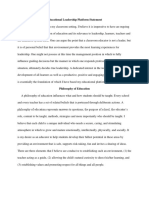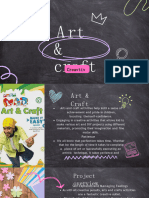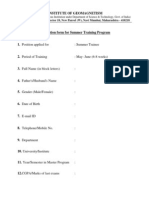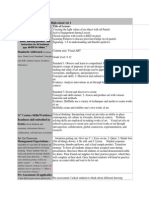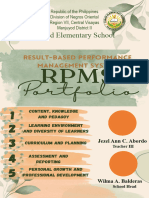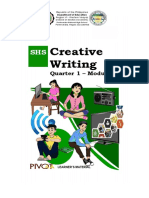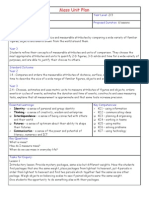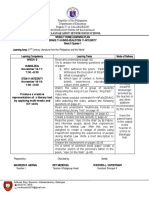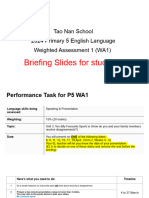Name: CANDICE JEAN E.
DUMLAO Course/Year: MaEd – 1
My Philosophy of Education
To teach is to inspire. As a teacher, my personal philosophy to inspire learners to become the person
they want to become. I believe, my goal as their teacher is to help them discover and realize their potentials
– and guide them in honing these potentials. Indeed, every learner is a potential genius. They have their own
gifts that they need to discover and hone. Each gift should be given equal chance for development. Thus, we
need education.
The purpose of Education
Education plays a vital role in honing learners’ gifts and talents. Education helps learners discover
and refine their gifts. It gives them the avenue to develop resilience and perseverance by providing learning
experiences. It helps recognize and cultivate individual strengths that become the weapon of the learners in
facing real life phenomena. It encourages imagination and critical thinking that may yield to future
discoveries and innovations. It prepares learners mentally, emotionally and physically to become productive
members of the society. It maximizes the opportunities for learners to optimize their potentials.
All in all, education becomes the cultivating factor that helps develop an individual holistically – to
be prepared in facing life’s circumstances.
The role of Education in the early 21st century
The role of education in the early 21 st century is multifaceted and evolving. According to various
experts and organizations, education plays a crucial role in developing critical thinking and problem –
solving skills (World Economic Forum, 2020). Education promotes the development of higher order
thinking skills (HOTS) to learners. This idea aims to produce students who are critical thinker and can face
the current challenges the world is facing. Moreover, education also prepares learners for a rapidly changing,
technology – driven world (UNESCO, 2015). The emergence of technology is indeed unstoppable. Infact, a
toddler as early as 2 years old is now using technology in learning the basic concepts of words and numbers.
Thus, education encourages the wise use of technology. Furthermore, education promotes the cultivation of
creativity, innovation and entrepreneurship (World Bank, 2018). With the fast changing world, it is a must
for every individual to become creative and innovative. For other people, business is better than having jobs.
Thus, it is a goal of education to develop learners who are creative, innovative and financial literate.
By fulfilling these roles, education can empower individuals, communities, and societies to thrive in
an increasingly complex, interconnected world.
The role of Leadership in today's Schools
The role of leadership in today's schools is crucial for driving student achievement, teacher development,
and school success. Effective leaders provide visionary direction (Leithwood et al., 2010), foster a positive
school culture (Cohen et al., 2009), and promote teacher collaboration and development (Marzano, 2010).
They also encourage student engagement and motivation, facilitate data-driven decision-making, and
empower stakeholders and build community partnerships.
Key leadership qualities include instructional leadership (Hallinger & Murphy, 1985), transformational
leadership (Leithwood & Jantzi, 1999), distributed leadership (Spillane, 2006), collaborative leadership
(Hargreaves & Fullan, 2012), and emotional intelligence (Goleman, 1995). Notable researchers like Michael
Fullan, John Hattie, Daniel Goleman, Ken Leithwood, and Richard Elmore emphasize the importance of
effective leadership in education.
�By embracing these roles and qualities, school leaders can create vibrant learning environments, improve
student outcomes, and address contemporary challenges. As Fullan (2016) notes, effective leadership is
essential for navigating the complexities of 21st-century education.
The Leaders roles and responsibilities in students learning
Effective leaders play a pivotal role in students' learning, fostering a positive school culture and
promoting academic excellence. According to Leithwood et al. (2010), leaders' responsibilities include
setting direction, developing people, and redesigning the organization. They must also: Provide instructional
leadership (Hallinger & Murphy, 1985), Support teacher development and collaboration (Marzano, 2010),
Foster a growth mindset and student engagement (Dweck, 2006), Ensure equity and inclusivity (Lindsay et
al., 2017), Utilize data-driven decision-making (Hattie, 2009). As noted by Fullan (2016), leaders must also:
Build trust and relationships with stakeholders, Empower teachers and students, Promote innovation and
continuous improvement.
Ultimately, leaders' roles and responsibilities impact student learning outcomes (Hattie, 2009). By
embracing these responsibilities, leaders can create learning environments that support student success.
School Leaders have Ethical Responsibilities
School leaders have ethical responsibilities to ensure a fair, inclusive, and supportive learning
environment. According to Starratt (2013), they must uphold moral principles, promoting social justice,
equity, and human rights. This includes fostering a culture of respect, empathy, and inclusivity (Gay, 2000),
ensuring transparency, accountability, and fairness (Fullan, 2016), and protecting student privacy and
confidentiality (FERPA, 1974). Leaders must also prevent bullying, harassment, and discrimination
(Olweus, 1993), support diverse needs and abilities (Tomlinson, 2001), and encourage critical thinking,
inquiry, and creativity (Dewey, 1933).
Moreover, leaders must model ethical behavior and integrity, engage in reflective practice and self-
improvement, and prioritize student well-being and safety (Duignan, 2006). By embracing these ethical
responsibilities, school leaders promote a positive school culture, support student growth, and uphold the
public's trust. Effective leadership is crucial in creating an environment where students, teachers, and staff
feel valued, respected, and empowered to succeed.
The most important skills and dispositions needed by school leaders
Effective school leaders possess essential skills and dispositions, including: Visionary leadership,
strategic thinking, and planning (Leithwood et al., 2010); strong communication, collaboration, and
interpersonal skills (Fullan, 2016); emotional intelligence, empathy, and self-awareness (Goleman, 1995);
adaptability, resilience, and continuous learning (Hargreaves & Fullan, 2012); data-driven decision-making
and problem-solving (Hattie, 2009); and cultural competence, inclusivity, and social justice awareness (Gay,
2000). Additionally, school leaders should demonstrate:Authenticity, integrity, and ethical leadership
(Duignan, 2006); ability to empower and develop others (Marzano, 2010); and commitment to student-
centered education, equity, and excellence (Lindsay et al., 2017).
In conclusion, an effective learning experience will only be achievable if everyone will work hand in
hand. School leaders should have good relationship to his workforce, stakeholders as well as the community.
He should be innovative and flexible. Teachers meanwhile should always work in rhythm with the school
�head. A school wherein both the leader, workforce, stakeholders and students who have the same goal will
likely achieve their goals.






